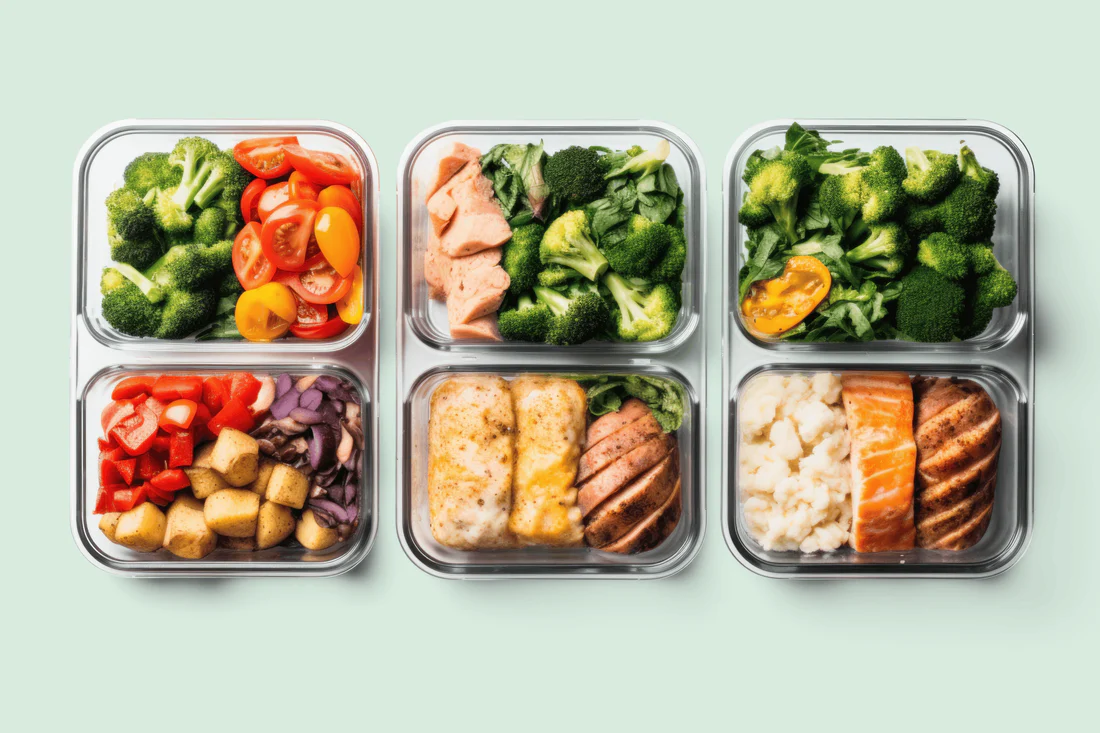In today’s fast-paced world, finding the time to prepare healthy meals can be a challenge. Enter meal prepping: a culinary strategy that not only promotes healthier eating habits but also saves time and reduces stress throughout the week. In this blog, we’ll explore the benefits of meal prep, provide tips for getting started, and share delicious recipe ideas to inspire your journey.
The Benefits of Meal Prepping
1. Healthier Choices
One of the most significant advantages of meal prepping is the ability to make healthier food choices. When you prepare meals in advance, you have greater control over ingredients, portion sizes, and nutritional content. This can help you avoid the temptation of fast food or processed snacks when hunger strikes.
2. Time and Stress Savings
Spending a few hours on the weekend or a designated day for meal prep can save you time during the busy workweek. By having ready-to-eat meals on hand, you’ll spend less time cooking and more time enjoying your food. This also reduces the stress of daily cooking and decision-making about what to eat.
3. Cost-Effectiveness
Buying ingredients in bulk and planning meals can lead to significant savings on your grocery bill. When you prepare meals at home, you can avoid the high costs of takeout and pre-packaged meals, making it easier to stick to your budget.
4. Reduces Food Waste
Meal prepping allows you to plan your meals around ingredients you already have, helping to minimize food waste. By using up fresh produce and other perishables, you can ensure that nothing goes to waste.
Getting Started with Meal Prep
1. Plan Your Meals
Begin by planning your meals for the week. Consider your schedule and identify days when you may be busier than usual. Aim for a balanced diet that includes a variety of proteins, whole grains, fruits, and vegetables.
2. Create a Shopping List
Once you’ve planned your meals, create a shopping list based on the ingredients you’ll need. This will help you stay organized and focused while grocery shopping, making it easier to avoid impulse purchases.
3. Set Aside Time for Prep
Choose a day that works for you—many people prefer Sunday—to dedicate to meal prepping. Set aside a few hours to cook, portion, and store your meals for the week ahead.
4. Invest in Quality Containers
Having the right containers is essential for meal prep. Look for BPA-free, microwave-safe, and leak-proof containers in various sizes to accommodate different types of meals. Glass containers are also a great option for easy reheating and durability.
Meal Prep Ideas to Get You Started
1. Breakfast Options
- Overnight Oats: Combine rolled oats, yogurt or milk, and your favorite toppings (fruits, nuts, seeds) in individual jars for a quick and nutritious breakfast.
- Egg Muffins: Whisk together eggs, spinach, diced peppers, and cheese, pour into muffin tins, and bake. These can be easily reheated throughout the week.
2. Lunch Options
- Grain Bowls: Prepare a base of quinoa or brown rice and top with roasted vegetables, chickpeas, and your choice of dressing. These bowls are versatile and can be customized to your taste.
- Wraps: Fill whole-grain wraps with lean protein (like turkey or grilled chicken), fresh veggies, and hummus for a satisfying lunch.
3. Dinner Options
- Sheet Pan Dinners: Roast a mix of proteins (chicken, tofu) and vegetables on a sheet pan with your favorite spices for an easy, one-pan meal that can be divided into portions.
- Stir-Fries: Cook up a variety of vegetables and proteins in a flavorful sauce, and serve over brown rice or whole-grain noodles. These are quick to make and can be stored easily.
4. Snack Ideas
- Energy Bites: Mix oats, nut butter, honey, and dark chocolate chips, then roll into bite-sized balls for a healthy snack.
- Veggies and Hummus: Cut up fresh vegetables and portion out hummus for a quick, nutritious snack.
Tips for Successful Meal Prep
- Stay Flexible: Life can be unpredictable, so it’s okay to adjust your meal plan as needed. Don’t stress if you don’t stick to it perfectly!
- Experiment: Try new recipes and flavors to keep your meals interesting. Meal prep doesn’t have to be boring!
- Label Your Containers: Use labels to indicate what each container holds and the date it was prepared. This helps with organization and food safety.
Conclusion
Meal prepping is an effective strategy for maintaining a healthy diet while managing a busy lifestyle. By planning, preparing, and portioning meals in advance, you can enjoy nutritious food, save time, and reduce stress throughout the week. Embrace the art of meal prep, and discover how it can transform your approach to healthy eating. Happy prepping!




